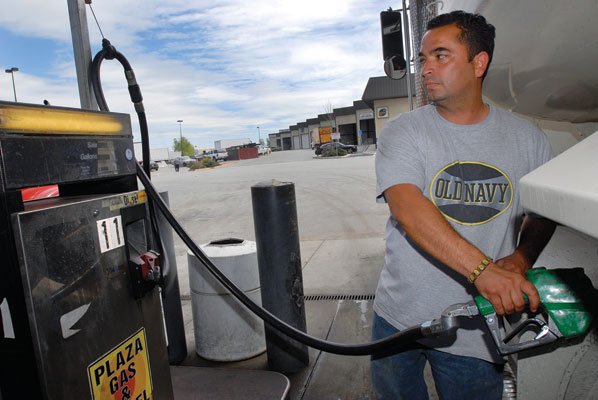A few thousand truckers striking indefinitely today won’t likely
have an immediate impact on consumers’ daily lives, but this
initial sign of discontent over sky-rocketing diesel costs could
eventually motivate more than just a handful of the nation’s chief
transporters to kill their engines.
A few thousand truckers striking indefinitely Tuesday won’t likely have an immediate impact on consumers’ daily lives, but this initial sign of discontent over sky-rocketing diesel costs could eventually motivate more than just a handful of the nation’s chief transporters to kill their engines.
Three years ago, diesel fuel averaged $2.21 per gallon across the country. Now it costs about $4.12 in California and more than $4 in half the states, according to the Energy Information Administration and AAA. Beyond this, many truckers who have to pay out of pocket for their fuel have trouble collecting reimbursements from the companies they work for or contract with because that means raising surcharges on deliveries, which ultimately falls on an already-wary consumer.
Dealing with rising fuel and insurance costs – the average owner/operator pays $600 to $800 a month for truck insurance – and a general lack of appreciation, all the truckers interviewed last week at the Garlic Farm truck stop off U.S. 101 in south Gilroy said they had not heard about the strike, but sure, they would pull off the road – only if everyone else did it, though.
“There’s no sense in going half way,” said Luis Reyes, a trucker from Oxnard who hauls flowers and produce. Reyes paid $637 for 154 gallons Thursday and said if diesel crosses the $4.50 threshold, then “it’s gone too far.”
“It’s out of control,” agreed John, a veteran trucker for the past 20 years who declined to give his last name. “It’s getting to the point where the customer is going to have to pay.”
As the owner of Tri Valley Truck Service in Milpitas for the past 24 years, Larry Radford said he’s heard the same from truckers for a while now, and that it’s time to rein in on the small number of oil companies who own the gas stations instead of owner-managers and make billions in profit each month.
“If they don’t do something, then eventually truckers will go out of business because the product they’re hauling is not going to compensate for the fuel they’re using,” Radford said. “Everybody in America is going to pay for it at the supermarket and at the hardware store.”
Right now most trucking companies charge their clients about a 10-percent fuel surcharge for deliveries, all those interviewed said Thursday. This surcharge is suppose to trickle down to the drivers who usually fill their tanks with their own money, but a lot of times the reimbursement gets dispersed unevenly, the truckers said.
The Owner-Operator Independent Drivers Association – which represents more than 160,000 small business trucking companies and drivers in America and Canada who operate more than 240,000 trucks – has warned against a strike. Jim Johnston, OOIDA’s president and CEO, said in the association’s official magazine last Thursday that federal law prohibits OOIDA from calling for a strike because it is a trade association. Instead, the OOIDA has lobbied the Bush administration to stop diverting oil supplied to the Strategic Petroleum Reserve and it has also backed federal legislation to ensure that drivers get repaid in full for pump costs.
Johnston cautioned that strikes during the gas crisis of the 1970s did not lower fuel prices. Rather, short-term relief came from the temporary implementation of a mandatory fuel surcharge, he said, but today there is no government entity like the Interstate Commerce Commission to raise rates across the board.
For Reyes and others, it’s hard to understand this when “even the pizza delivery guys have surcharges now,” Reyes said. But even “a surcharge does not eradicate fuel costs. It just passes it on even higher,” said Radford. And when it comes to lowering fuel taxes to help truckers, Radford predicted that won’t happen because “you’re dealing with broke states and a broke federal government, and taxes are another source of income for them.”
In Denver last week, U.S. Transportation Secretary Mary Peters, who was appointed by President Bush 18 months ago, acknowledged that the American Trucking Association has lobbied for relief on Capitol Hill, but she said a trucking strike is not the right idea.
“I don’t think it would be a very good thing for our country at all, and if the strike is because of high fuel prices, I think that would be taking an action that would affect American businesses and American consumers for something that they don’t have a direct relationship to,” Peters told CBS 4 in Denver.
Either way, striking is easier for drivers like Reyes who own their own trucks. Working for a company, on the other hand, makes it harder for drivers like Jorge Aguayo to strike. Aguayo – who was hauling gravel and sand last Thursday and said he could not do anything else besides drive a truck – said he only partially fills the company rig each time he stops as a protective measure, but he could not see himself striking without nationwide assurance.
“If everybody else did it, I would strike,” said Aguayo.















